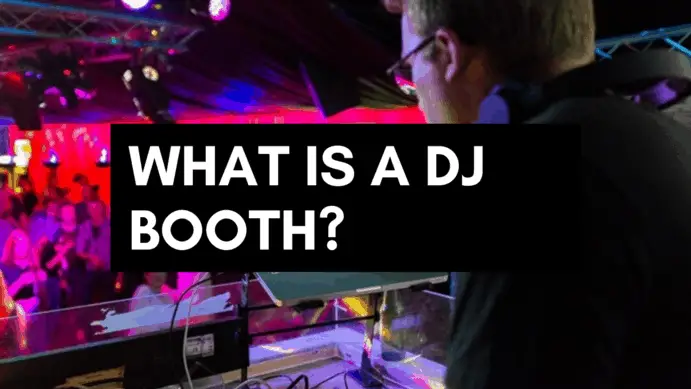
When you step into a nightclub or enter a social event, one of the things that you notice first is the music coming from the DJ booth. You may even realize the volume increasing and decreasing and observe lights flashing all over the place. The DJ booth usually controls all these things.
So, what is a DJ booth? A DJ booth is a small area in a club or other event space that is separated from a larger public area and usually plays host to the disc jockey. The booth is the control center of the sound system. It typically holds equipment such as a turntable, microphones, and computer.
Read on to find out more about the types of DJ booths, what you will generally find in them, and essential things to know when you are around DJ booths.
Types of DJ Booths
There are two main types of DJ booths – mobile and permanent booths.
Mobile DJ booths are often constructed using lightweight materials for ease of transport. They can be assembled and dismantled within a short time. They are ideal for entertainers that move from one place to another. Some businesses usually rent out mobile DJ booths.
Permanent DJ booths are usually constructed within a building using sturdy materials to ensure durability. They are often found in nightclubs, restaurants, and other entertainment venues in which a DJ appears frequently.
Features of a DJ Booth
The DJ booth is usually packed with different functional and decorative elements to create an upbeat ambiance and make it easy for the disc jockey to control the entertainment. “7 Lifesavers for Your DJ Booth” discusses some of the things you need to make sure to have in your booth.
Some of the critical features of a DJ booth include:
Mains Electricity Ports
All DJ booths feature mains electricity ports. This makes it possible to connect multiple electronics. Some of the things that can be connected include the turntable, computer, and other smart devices.
The mains usually have a current protection adapter to guard against power surges or spikes that may otherwise damage devices. Additionally, a DJ booth will typically have multiple surge protectors to have as many outlets available as possible.
Storage Compartment
Most DJ booths feature a storage compartment that makes it easy for the disc jockey to keep useful items around. Flash drives, connection cables, chargers, and personal accessories are among some of the things that can be held in the storage compartment.
Table or Stand
All DJ booths have a table or stand to hold equipment such as the laptop and turntable.
Lights
All DJ booths have light for visibility. Keep in mind that most nightclubs have dim lights, so the DJ needs extra illumination to ensure they can see everything they need to see. The DJ booth may also feature decorative lights for creating an upbeat ambiance in line with the events that are going on.
Adjustable Monitors
Monitors are speakers that are placed strategically within the DJ booth that allows the disc jockey to hear what the crowd hears. This way, the DJ can adjust the sound accordingly.
A booth that does not have monitors usually makes it hard for DJs to do their job well. They must rely on the sounds coming from main speakers on the floor, and that can mean turning the volume higher than they should.
Space for Drinks and Gear
Because a DJ will frequently mix all night, they need ample room for placing drinks. The area for drinks should be a safe distance away from electronics because there is always the potential for accidents.
The DJ booth is usually small, making it difficult for the DJ to have space for any additional gear. However, it is necessary to allocate some space next to the booth for extra equipment.
Other Things to Keep in Mind
To ensure convenience and smooth operation within the DJ booth, there are additional things you should keep in mind.
- Keep paper towels or rags nearby in the case of a spill. Vibrations from the sound system can cause spills, and drinking patrons can also spill their drinks on the equipment.
- Having extra chargers for phones and other devices can be helpful. The DJ can keep their devices charged, and sometimes patrons will ask for a phone charger.
- Keeping an extra microphone is vital to make sure the disc jockey can carry out their live event with no inconveniences.
Important Rules of a DJ Booth
If you are a disk jockey or someone that runs a business with a DJ booth, there are rules that you must enforce to ensure the entertainment runs smoothly.
1. Create a Boundary
One of the most important things to do is to ensure that all patrons know their boundaries. Having anyone going in and out of the DJ booth is not only unsafe but may lead to frequent interruptions.
Let everyone know that they can make requests from a distance without necessarily coming into the booth. Some disc jockeys usually have assistants by their side to listen to any issues that patrons want to say.
2. Plugging and Unplugging Cables
A DJ booth is generally full of wires stretching from one device to another. Disconnecting any of the cables without knowing their purposes can cause several issues. Not only can the entire system be turned off, but some devices may even end up getting damaged.
Everyone should know that only authorized people should plug or unplug cables in and around the DJ booth.
3. Drink Placement
Anyone that is given access to a DJ booth must know that all drinks have a designated placement area. Proper drink placement is key to guarding against accidents that may cause damage to electronics. It is worth pointing out that spilled drinks can cause a fire outbreak when they encounter a live electricity current.
4. Microphone Usage
The last thing you want is to hear a drunk patron shouting on the microphone while you are in the middle of a mix. That is why you should always keep your microphones away from the patrons. It is equally crucial for you to turn all microphones off when not in use.
5. Keep Spare Parts and Extra Accessories
A short circuit can damage your laptop or other electronics you are using to control and run your mixes. That is why you should have extra items. Cables, flash drives, microphones, and chargers are among some of the most important additional accessories to have.
6. Arrive Early
As a DJ, you should always strive to arrive early to your booth. This allows you to carry out initial tests and replace any cables or adapters that may be faulty. Early preparations are vital to ensuring that there is no interruption during the entertainment.
In Conclusion
If your DJ booth is lacking in any of the features mentioned above, it may be a good idea for you to invest in some of them to improve your booth. The good news is that upgrading your booth is not a daunting task and is usually affordable.
Once the booth is set up, you need to ensure that everybody knows about the rules. Consider placing a sign with the rules on the outside of your booth in a place that patrons can easily see. This will not only offer more safety and security for the booth itself but will also allow the DJ to work effectively.
Related Questions
What does a DJ set mean?
A DJ set is a list of tracks that a DJ plays within an allotted amount of time. Usually DJs play for 60 minutes or 120 minutes, some DJs play longer. A DJ set can usually be seen online after a DJ has played a gig.
Do you need a mixer with a DJ controller?
It’s not essential to have a DJ mixer to operate a DJ controller. A DJ mixer has a mixer built-in allowing DJs to transition between music tracks.
What is a DJ booth monitor?
DJ booth monitors are speakers that allow DJs to hear clearly the music that they are DJing. The loud speakers are playing live to the audience, so a DJ booth monitor allows for less or no lag in the audio being played providing better feedback to the DJ to beat match music.
